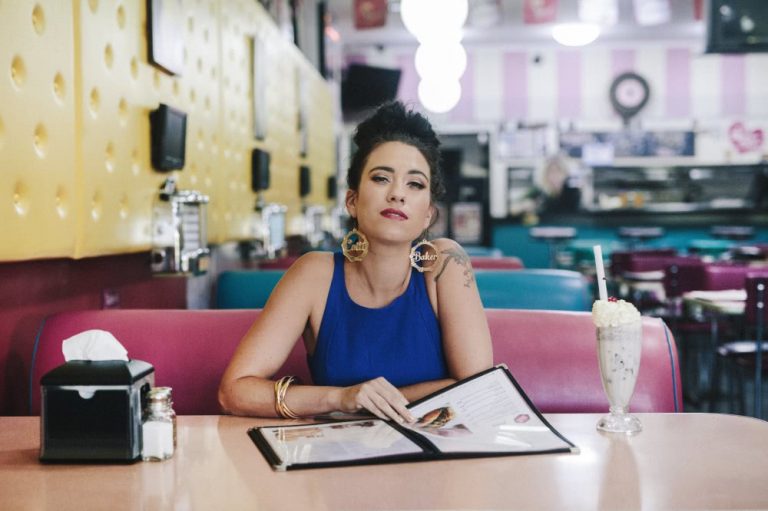A few years ago, Caiti Baker was ready to burn it all down. Already an established force in hip hop and indie thanks to her work as one half of the electro-soul outfit Sietta, she suddenly found herself embroiled in a string of energy-consuming personal crises. Her job was burning her out; she was struggling with both mental health issues and her chronic fatigue syndrome; and she had fallen out with her father some four years previously. “Everything came to a climax,” Baker says now. “I just wanted to throw it all away. It was a mess, to tell you the truth.” She laughs.
Baker laughs a lot, actually. She is sitting somewhere in a café in Darwin, preparing for the beginning of a tour that will see her take Zinc, her debut record under her own name, around the country. And although it is a hot, lazy Friday – one of those days best spent seeking shelter from the sun and doing a whole lot of nothing – she speaks animatedly; with humour, and with wit.
It’s a place of solitude that I write in.
“I prefer to write alone,” Baker says of her creative habits. “It’s therapeutic for me – and it’s not to say that I don’t like co-writing, but for me to write the stuff I want to write, I generally find it’s much easier and more of a pleasant experience if I’m just by myself. I’m likely to sing things that I’m not always happy with sharing people just yet – not until I find where I’m going with it.
“Also, I have quite a loud voice. So I like to be in a place where no one else can hear. It’s a place of solitude that I write in. I don’t write nearly as much as I should, and I don’t write in diaries, which means I don’t have streams of my thoughts written down on paper. So when I do write, it’s initially going to be quite personal – I have to work out how to bend it into shape without feeling judged and without feeling like I’m wasting someone else’s time.”
It was in that place of solitude that Baker wrote Zinc, mostly as a way of working out the fucked-up shit that everyone has to come to terms with eventually; the issue of her job, and her mental health, and her fractured familial connections. “I got some help and managed to work my way through all my mental health stuff. And all through that I was writing – I just wasn’t sure what I was going to do with it.”
A lot of what Baker was writing wasn’t even designed to be confessional, and to this day she never sets out to pen songs that might double as diary entries. She just can’t work that way – can’t demand anything of her art. Often, she’s not even sure what her work is about till months later, and suddenly everything snaps into focus. “My subconscious will get things out. I use a lot of metaphors so things are going up in my life are often hidden, a little bit. Or I’ll like, use a line from a TV show, or a book I’ve read, or a film. Inspiration comes from anywhere and everywhere.”
Everything just fell into place at exactly the time that it needed to.
It was while Baker was holed up, newly unemployed and writing the songs that would eventually make up Zinc, that her father got back in touch. A blues player himself, he reached out not with words but with music, passing on a USB key worth of “guitar licks, harmonica parts and vocal ideas” to Baker’s longtime collaborator and friend James Mangohig.
The material was formless; more like sketches than complete drawings. “You could hear him talking to the cat,” Baker says of some of the recordings. But nonetheless, she was inspired, and almost immediately got to work building the parts into fully-fledged songs, constructing melodies and choruses out of the scattered loops. “Everything just fell into place at exactly the time that it needed to,” Baker says.
She knew straight away that the material she was producing wasn’t right for the Sietta moniker – it was different; more obviously bluesy; less dense and layered. She wasn’t reinventing herself as much as she was refining herself, and the result was a bold new direction.
“It was a new sound that could only have come through my musical heritage, that being my father’s blues playing, and through the production style of James, which I am such a big fan of. All of those elements just streamlined into something I am so proud of.”
And yet still there was the problem of what to call herself as an artist, if not Sietta. It was an old issue – when Baker and Mangohig had first started collaborating, he had suggested they release music under her name. But she had felt then as though she wasn’t ready. “I didn’t want that level of personal exposure – I had chronic fatigue, and I had just been diagnosed with bipolar disorder. I wasn’t myself. So it didn’t make sense to put my own name.”
But now, years later, having undergone therapy and with the excitement of the new project to motivate her, Baker finally felt ready to be herself. “I am healed. I’m a different person. I am essentially who I should be. So I feel the authenticity is there to release music under my own name. I can own it.” She laughs again, one more time, the sound as rich as whiskey. “I can own my shit.”
Caiti Baker plays Leadbelly on Saturday October 14.


































